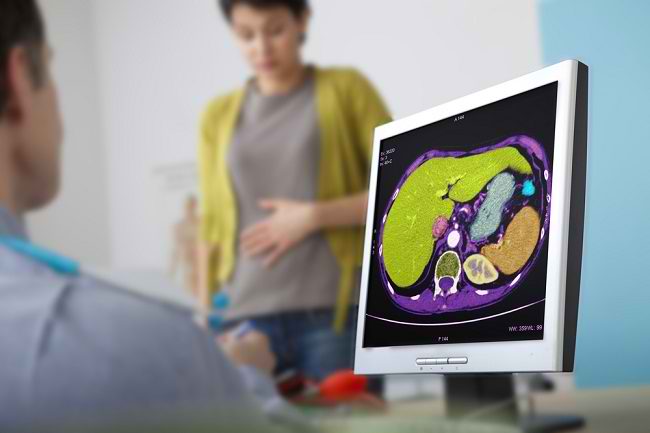Interferon gamma-1b is a drug to reduce the frequency and severity of infections, in patients with chronic granulomatous disease. This drug is also used to slow the progression of severe malignant osteopetrosis.
Interferon gamma-1b works by mimicking the work of interferon in the body. Interferon is a natural protein in the body that plays a role in the immune system. Additional interferon injections are expected to help the immune system to fight infection.

Trademarks of interferon gamma-1b: -
What is Interferon Gamma-1b
| group | Prescription drugs |
| Category | Immunomodulators and interferons |
| Benefit | Reducing the frequency of serious infections due to chronic granulomatous disease or slowing the progression of severe malignant osteopetrosis |
| Used by | Adults and children |
| Interferon gamma-1b for pregnant and lactating women | Category C: Animal studies have shown adverse effects on the fetus, but there are no controlled studies in pregnant women. Drugs should only be used if the expected benefit outweighs the risk to the fetus. Interferon gamma-1b is not known to be absorbed into breast milk or not. For breastfeeding mothers, do not use this medicine without consulting your doctor first. |
| Shape | Inject |
Precautions Before Using Interferon Gamma-1b
Interferon gamma-1b should only be used as prescribed by a doctor. Note the following points before using interferon gamma-1b:
- Tell your doctor about any allergies you have. Interferon gamma-1b should not be given to patients who are allergic to this drug.
- Tell your doctor if you have or have had chest pain (angina), arrhythmia, congestive heart failure, liver disease, seizures, anemia, neutropenia, or thrombocytopenia.
- Tell your doctor if you are taking any medications, supplements, or herbal products.
- Tell your doctor if you are pregnant, breastfeeding, or planning a pregnancy.
- Do not consume alcoholic beverages while on treatment with interferon gamma-1b, as this can increase the risk of side effects.
- Do not drive, operate heavy machinery, or do anything that requires alertness while taking interferon gamma-1b, as this drug can cause excessive fatigue.
- Tell your doctor if you plan to get vaccinated while on treatment with interferon gamma-1b.
- See your doctor right away if you have an allergic drug reaction, serious side effect, or overdose after using interferon gamma-1b.
Dosage and Instructions for Use of Interferon Gamma-1b
The dose of interferon gamma-1b prescribed by a doctor can be different for each patient. Interferon gamma-1b injection will be done under the skin (subcutaneous / SC). The following is the dosage of interferon gamma-1b based on the intended use, body surface area (LPT), body weight, and patient age:
Purpose: Reducing the frequency of infection and the severity of infection in patients with chronic granulomatous disease
- Adults with body surface area (LPT) >0.5 m2 is 50 mcg/m2, 3 times a week.
- Adult with LPT 0.5 m2 is 1.5 mcg/kg, 3 times a week.
- Children with LPT >0.5 m2 is 50 mcg/m2LPT, 3 times a week.
- Children with LPT < 0.5 m2 is 1.5 mcg/kg, 3 times a week.
Purpose: Delays the development of severe malignant osteopetrosis
- Adults with LPT >0.5 m2 is 50 mcg/m2, 3 times a week.
- Adult with LPT 0.5 m2 is 1.5 mcg/kg, 3 times a week.
How to Use Interferon Gamma-1bcorrectly
Interferon gamma-1b injection will be given by a doctor or medical officer under the supervision of a doctor. The injection will be given into the skin, usually in the upper arm, abdomen, or thigh. Always follow the doctor's advice while undergoing treatment with this medicine.
During treatment with interferon gamma-1b, your doctor will ask you to undergo kidney function tests or blood tests, regularly to monitor your response to therapy and your condition. Do not stop treatment without consulting your doctor first.
Interferon Gamma-1b Interaction with Other Drugs
There are several drug interaction effects that can occur when interferon gamma-1b is used with other drugs, namely:
- Increased risk of bone marrow damage when used with zidovudine
- Increased risk of developing inflammation of the pancreas or pancreatitis when used with bexarotene
- Increased risk of seizures when used with bupropion
- Increased risk of infection with siponimod, baricitinib, clozapine, deferipone, or fingolimod
Side Effects and Dangers of Interferon Gamma-1b
At the beginning of the use of interferon gamma-1b, one of the side effects that can occur is the appearance of flu symptoms which can be characterized by certain symptoms, such as headache, fatigue, fever, chills, or muscle aches.
These side effects will generally get better on their own. In addition, other side effects that can occur after using interferon gamma-1b are:
- Stomach ache
- Diarrhea
- Nausea or vomiting
- Pain, tenderness, redness in the area of the skin that was injected
See a doctor if the above symptoms do not improve or get worse. See your doctor right away if you experience a drug allergic reaction and serious side effects, such as:
- Blurred vision, tremors, weakness on one side of the body, slurred speech, or convulsions, confusion, very severe dizziness, or fainting
- An infectious disease that can be characterized by certain symptoms, such as fever, chills, or a sore throat that doesn't get better
- Impaired liver function that can be characterized by certain symptoms, such as jaundice, dark urine, severe abdominal pain, or severe nausea and vomiting
- Shortness of breath, chest pain, swelling in the hands or feet, or a fast, slow, or irregular heart rate









